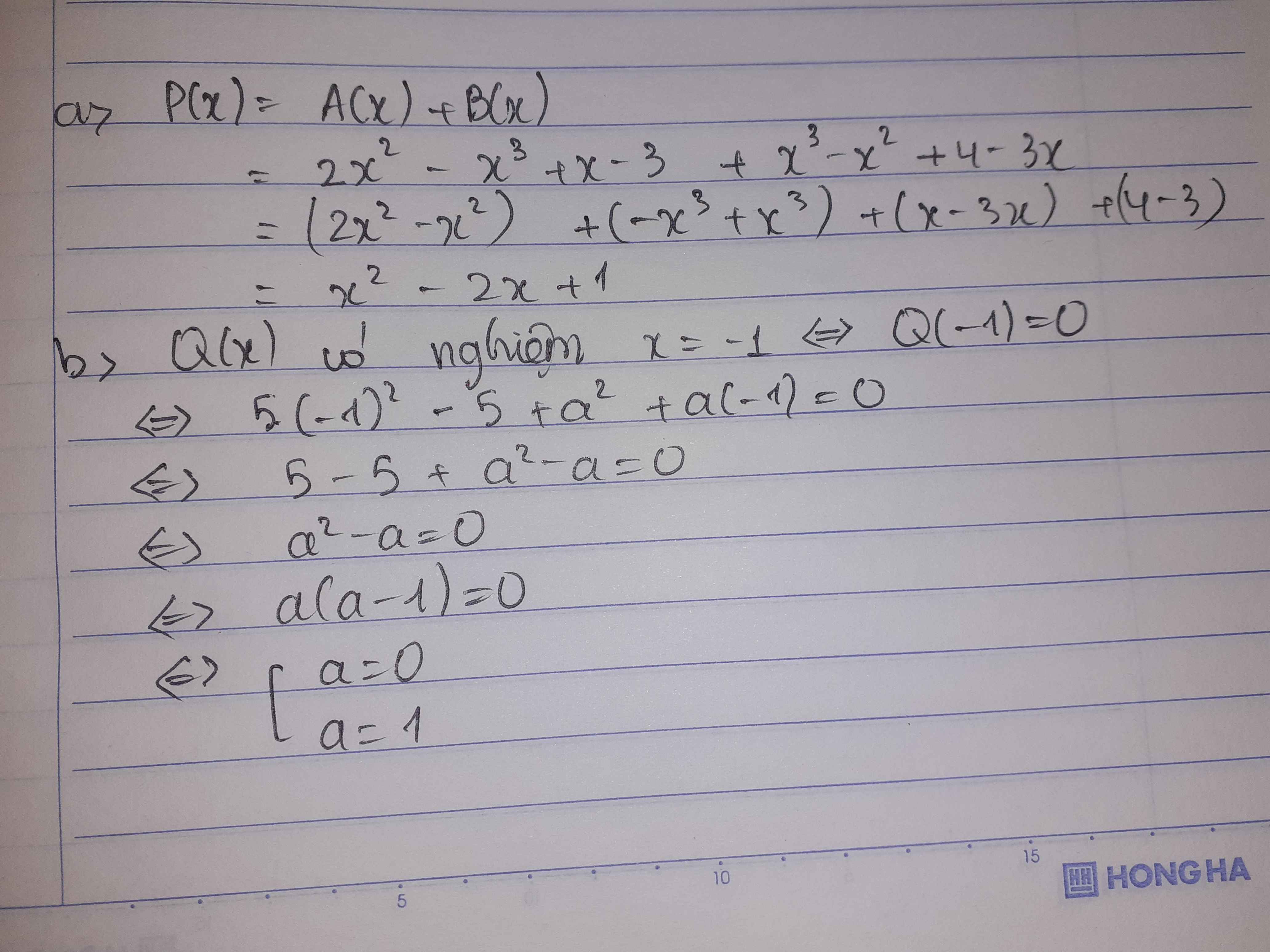Hãy nhập câu hỏi của bạn vào đây, nếu là tài khoản VIP, bạn sẽ được ưu tiên trả lời.

a: \(P\left(x\right)=-5x^3+3x^2+2x+5\)
\(Q\left(x\right)=-5x^3+6x^2+x+5\)
b: \(H\left(x\right)=Q\left(x\right)+P\left(x\right)=-10x^3+9x^2+3x+10\)
Khi x=1/2 thì \(H\left(x\right)=-10\cdot\dfrac{1}{8}+\dfrac{9}{4}+\dfrac{3}{2}+10=\dfrac{25}{2}\)

a: \(P\left(x\right)=-5x^3+3x^2+2x+5\)
\(Q\left(x\right)=-5x^3+6x^2+2x+5\)
b: \(H\left(x\right)=P\left(x\right)+Q\left(x\right)=-10x^3+9x^2+4x+10\)
\(H\left(\dfrac{1}{2}\right)=-10\cdot\dfrac{1}{8}+\dfrac{9}{4}+2+10=13\)
c: Q(x)-P(x)=6
\(\Leftrightarrow3x^2=6\)
hay \(x\in\left\{\sqrt{2};-\sqrt{2}\right\}\)

a: P(x)=5x^3+3x^2-2x-5
\(Q\left(x\right)=5x^3+2x^2-2x+4\)
b: P(x)-Q(x)=x^2-9
P(x)+Q(x)=10x^3+5x^2-4x-1
c: P(x)-Q(x)=0
=>x^2-9=0
=>x=3; x=-3
d: C=A*B=-7/2x^6y^4

a: \(P\left(x\right)=A\left(x\right)+B\left(x\right)=2x^2-x^3+x^3-x^2-3x+4=x^2-3x+4\)
b: Theo đề, ta có: Q(-1)=0
\(\Leftrightarrow5-5+a^2-a=0\)
=>a(a-1)=0
=>a=0 hoặc a=1
a, \(P\left(x\right)=2x^2-x^3+x^3-x^2+4-3x=x^2-3x+4\)
b, Ta có \(Q\left(-1\right)=5-5+a^2+a=a^2+a=0\)
\(\Leftrightarrow a\left(a+1\right)=0\Leftrightarrow a=0;a=-1\)

a: \(P\left(x\right)=-5x^3+3x^2+2x+5\)
\(Q\left(x\right)=-5x^3+6x^2+2x+5\)
b: Q(x)-P(x)=6
\(\Leftrightarrow-5x^3+6x^2+2x+5+5x^3-3x^2-2x-5=6\)
=>3x2=6
hay \(x\in\left\{\sqrt{2};-\sqrt{2}\right\}\)

P(x)=15 - 4x3 + 3x2 + 2x - x3 - 10
và Q(x)=5 + 4x3 + 6x2 - 5x - 9x3 + 7x
a) P(x)= -5x^3 + 3x^2 + 2x + 5.
Q(x)= -5x^3 + 6x^2 + 2x + 5.
b)
P(x)= -5x^3 + 3x^2 + 2x + 5 tại x= 1/2.
P(x)= -5 . 1/2^3 + 3 . 1/2^2 + 2 . 1/2 +5 = 49/8.
Q(x)= -5x^3 + 6x^2 + 2x + 5 tại x= 1/2
Q(x)= -5 . 1/2^3 + 6 . 1/2^2 + 2 . 1/2 +5= 55/8.
c)
P(x) - Q(x)= (-5x^3 + 3x^2 + 2x + 5) - (-5x^3 + 6x^2 + 2x + 5)
Kết quả -3x^2.
Nhớ nhấn like đấy

a: P(x)=-5x^3+6x^2+3x-1
Q(x)=-5x^3+6x^2+4x+2
b: H(x)=-5x^3+6x^2+3x-1-5x^3+6x^2+4x+2
=-10x^3+12x^2+7x+1
T(x)=-5x^3+6x^2+3x-1+5x^3-6x^2-4x-2
=-x-3
c: T(x)=0
=>-x-3=0
=>x=-3
d: G(x)=-(-10x^3+12x^2+7x+1)
=10x^3-12x^2-7x-1

\(P\left(\dfrac{1}{2}\right)+Q\left(\dfrac{1}{2}\right)=-5.\left(\dfrac{1}{2}\right)^3+3\left(\dfrac{1}{2}\right)^2+\dfrac{2}{2}+5-5\left(\dfrac{1}{2}\right)^3+6\left(\dfrac{1}{2}\right)^2+\dfrac{2}{2}+5\)
\(P\left(\dfrac{1}{2}\right)+Q\left(\dfrac{1}{2}\right)=-\dfrac{5.1}{8}+\dfrac{3.1}{4}+6-\dfrac{5.1}{8}+\dfrac{6.1}{4}+6\)
\(P\left(\dfrac{1}{2}\right)+Q\left(\dfrac{1}{2}\right)=-\dfrac{5}{8}+\dfrac{3}{4}+6-\dfrac{5}{8}+\dfrac{3}{2}+6\)
\(P\left(\dfrac{1}{2}\right)+Q\left(\dfrac{1}{2}\right)=13\)
\(Q\left(x\right)-P\left(x\right)=6\)
\(-5x^3+6x^2+2x+5+5x^3-3x^2-2x-5=6\)
\(3x^2=6\)
\(x^2=2\)
\(=>x=\pm\sqrt{2}\)